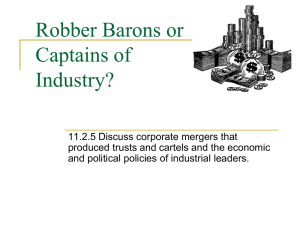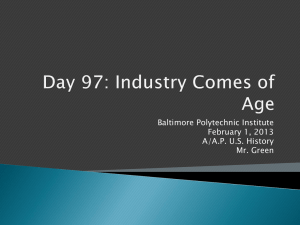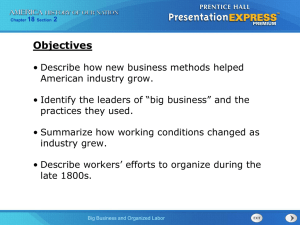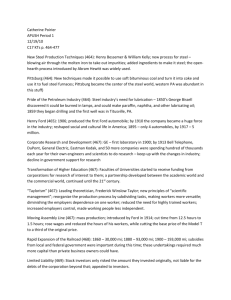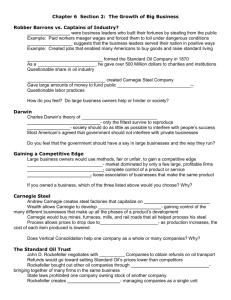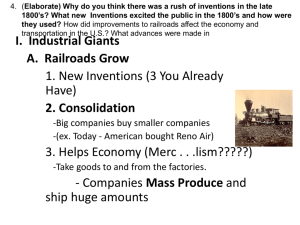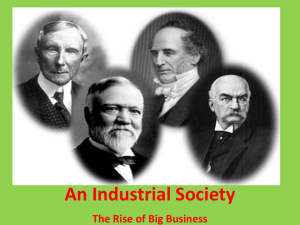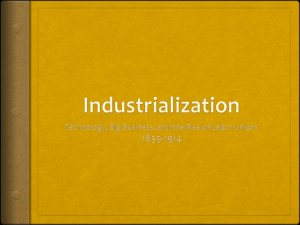The Rise of Big Business
advertisement
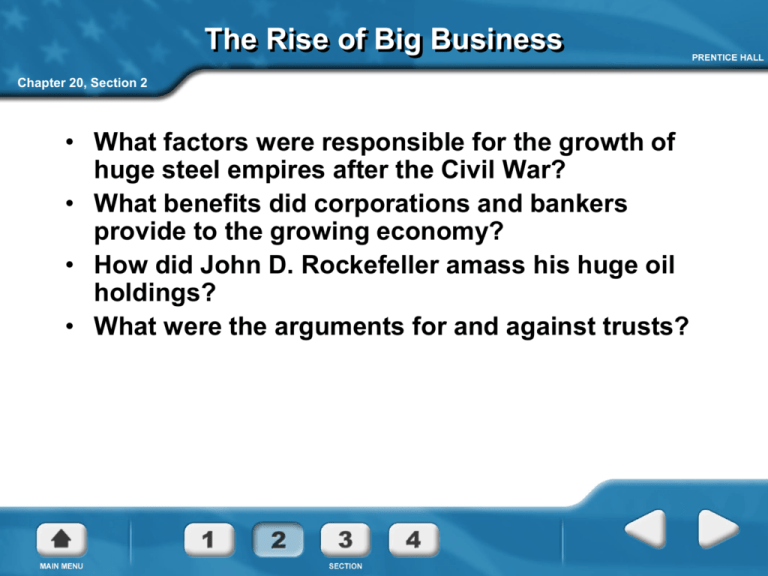
The Rise of Big Business Chapter 20, Section 2 • What factors were responsible for the growth of huge steel empires after the Civil War? • What benefits did corporations and bankers provide to the growing economy? • How did John D. Rockefeller amass his huge oil holdings? • What were the arguments for and against trusts? The Growth of the Steel Industry Chapter 20, Section 2 Bessemer process • In the 1850s, William Kelly in the United States and Henry Bessemer in England each discovered a new way to make a strong steel at a low cost. This way of making steel came to be called the Bessemer process. Steel mills • Steel mills sprang up in cities throughout the Midwest. Pittsburgh became the steel-making capital of the nation. The steel boom brought jobs and prosperity. It also caused problems, such as polluted water and air. Andrew Carnegie • Andrew Carnegie began with one steel mill, then used his profits to buy out rivals. He also bought iron mines, railroad and steamship lines, and warehouses. Soon he controlled all phases of the steel industry from mining iron ore to shipping finished steel. Gaining control of all the steps used to change raw materials into finished products is called vertical integration. Corporations and Bankers Chapter 20, Section 2 • • • • By the late 1800s, big factories were producing goods more cheaply than small factories. To expand, big factories needed capital, or money, for investment in raw materials, workers’ pay, and shipping and advertising costs. Many expanding businesses became corporations—businesses owned by investors. • A corporation sells stock, or shares in the business, to investors, who are known as stockholders. • In return for their investment, stockholders hope to receive dividends, or shares of a corporation’s profit. Corporations also raised money by borrowing millions of dollars from banks. These loans helped American industry grow at a rapid pace. The most powerful banker of the late 1800s was J. Pierpont Morgan. He used his banking profits to gain control of major corporations. By 1901, he had become the head of the United States Steel Company, the first American business worth more than $1 billion. John D. Rockefeller’s Oil Empire Chapter 20, Section 2 • • • • • • In 1859, drillers near Titusville, Pennsylvania, made the nation’s first oil strike. John D. Rockefeller recognized that oil had little economic value until it was refined to make kerosene. He built an oil refinery. Rockefeller believed that competition was wasteful. He used his profits to buy up other refineries. He combined the companies into the Standard Oil Company. He did whatever he could to get rid of competition. He slashed prices so others could not compete, pressured customers not to deal with other companies, and forced railroads to grant rebates to Standard Oil. Rockefeller formed the Standard Oil trust—a group of corporations run by a single board of directors. Stockholders in smaller oil companies turned over their stock to Standard Oil. In return, they got stock in the new trust. The Standard Oil board of directors managed all the companies that used to be the competition. Standard Oil trust had created a monopoly of the oil industry. A monopoly controls all or nearly all the business of an industry. Arguments For and Against Trusts Chapter 20, Section 2 In a free enterprise system, businesses are owned by private citizens. Private citizens decide what to make, how much to produce, where to sell, and what to charge. Some Americans said large corporations hurt the free enterprise system. The Argument Against Trusts • Trusts and monopolies reduce competition. Without competition, there is no need to keep prices low or improve products. • New companies can’t compete with powerful trusts. • Trusts have too much political influence. They are able to buy favors from elected officials. The Argument in Favor of Trusts • Competition can ruin businesses and put people out of work. • The wealthy contribute the most to the community. • Corporations bring lower production costs, lower prices, higher wages, and a better quality of life for all. • By 1900, Americans had the highest standard of living in the world. In 1890, Congress passed the Sherman Antitrust Act, banning the formation of trusts and monopolies. However, the law was too weak to be effective. The Growth of American Business • Steel and oil become giant industries • Monopolies and trusts dominate important industries • Factory workers face harsh conditions • Membership in labor unions grows Effects Today Effects • Railroad boom spurs business • Businesses become corporations • Nation has rich supply of natural resources • New inventions make business more efficient The Rise of Industry Causes Chapter 20, Section 2 • United States is world’s leading economic power • American corporations do business around the world • Government laws regulate monopolies
